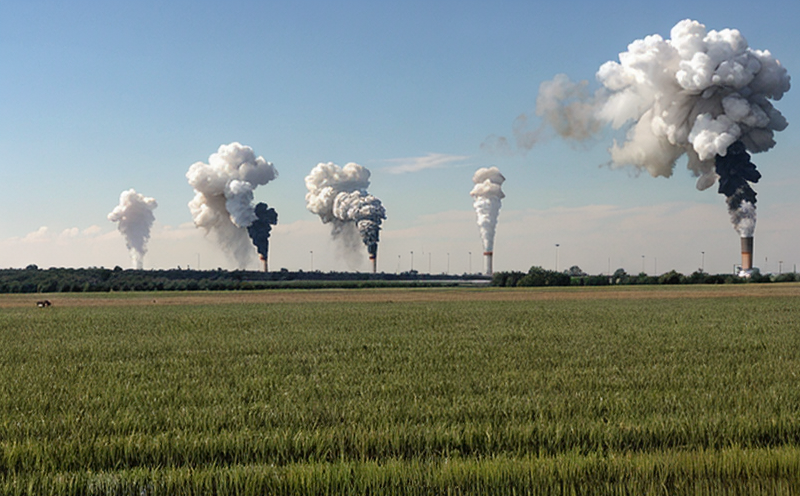ISO 6468 Organochlorine Pesticides in Water Test
The ISO 6468 standard outlines the methodologies for determining organochlorine pesticides (OCPs) in water samples. OCPs are a class of synthetic chemicals used widely as pesticides until their environmental and health impacts were recognized, leading to their restriction or ban in many countries.
Organochlorine pesticides include notorious compounds such as DDT, chlordane, endosulfan, and heptachlor. These persistent organic pollutants (POPs) can bioaccumulate in the food chain, posing significant risks to human health and ecosystems. The ISO 6468 test is crucial for ensuring compliance with environmental regulations and supporting sustainable water resource management.
The testing process involves several critical steps, including sample collection, preservation, and analysis using gas chromatography coupled with mass spectrometry (GC-MS). Sample preparation typically includes filtration to remove particulates followed by extraction techniques like liquid-liquid partitioning or solid-phase extraction. This ensures accurate quantification of OCP residues.
The standard provides detailed procedural guidelines for ensuring consistent results across different laboratories, which is essential given the variability in water matrices and potential interferences from other compounds. Compliance with ISO 6468 is mandatory for industries involved in water treatment, agriculture, and environmental protection to ensure adherence to local and international standards.
The test's robustness and precision make it indispensable for monitoring OCP levels in various water bodies, including surface waters, groundwaters, and wastewater effluents. This testing supports the implementation of effective remediation strategies and helps track the effectiveness of pollution control measures over time.
A key aspect of this service is its role in supporting regulatory compliance. Regulatory frameworks such as the Stockholm Convention on Persistent Organic Pollutants (POPs) mandate the reduction and eventual elimination of OCPs from the environment. ISO 6468 ensures that water samples are analyzed accurately, providing reliable data for stakeholders to make informed decisions.
Another critical application is in supporting research aimed at understanding the behavior and fate of OCPs in aquatic environments. This knowledge is vital for developing more effective remediation technologies and strategies. Additionally, this test plays a crucial role in assessing the impact of water treatment processes on OCP levels and ensuring that treated waters meet stringent quality standards.
Finally, ISO 6468 testing supports the broader goal of environmental stewardship by providing actionable data for decision-makers. By identifying areas with high OCP concentrations, authorities can prioritize interventions and allocate resources effectively. This service contributes significantly to sustainable development goals by promoting cleaner water bodies and healthier ecosystems.
Environmental and Sustainability Contributions
The ISO 6468 organochlorine pesticides test contributes significantly to environmental sustainability by providing crucial data for monitoring OCP levels in water bodies. This information is essential for tracking the effectiveness of pollution control measures and supporting the implementation of remediation strategies.
By ensuring that treated waters meet stringent quality standards, this service helps protect human health and aquatic ecosystems from the harmful effects of OCPs. The test supports regulatory compliance with international frameworks like the Stockholm Convention, which aims to reduce the production and use of POPs.
The data generated by ISO 6468 testing is also valuable for research purposes, enabling scientists to understand the behavior and fate of OCPs in aquatic environments. This knowledge can be used to develop more effective remediation technologies and strategies. Furthermore, this service supports broader environmental stewardship goals by providing actionable insights that help prioritize interventions and allocate resources effectively.
By promoting cleaner water bodies and healthier ecosystems, ISO 6468 testing contributes to sustainable development objectives such as reducing pollution, conserving biodiversity, and ensuring the availability of clean water for future generations. This service plays a vital role in achieving these goals by providing reliable data that informs effective decision-making.
Use Cases and Application Examples
The ISO 6468 test is widely used across various sectors, including water treatment plants, agricultural industries, environmental protection agencies, and research institutions. Water treatment facilities use this test to monitor the effectiveness of their purification processes in removing OCPs from raw water sources before it enters distribution systems.
Agricultural companies leverage ISO 6468 testing to ensure that their operations comply with international standards regarding pesticide usage and environmental impact. Environmental agencies employ this service to assess the extent of OCP contamination in surface waters, groundwaters, and wastewater effluents.
Research institutions also rely on ISO 6468 for studying OCP behavior in aquatic ecosystems, developing new remediation techniques, and evaluating the long-term impacts of pollution control measures. In addition, this test helps in validating the performance of emerging water treatment technologies designed to address OCP contamination.
The versatility of ISO 6468 testing allows it to be applied in diverse scenarios ranging from routine monitoring programs to specialized research projects focused on understanding specific aspects of OCP behavior and fate. Its comprehensive approach ensures that all relevant parameters are considered, providing a holistic view of the issue at hand.
Benefits
- Regulatory Compliance: Ensures adherence to environmental regulations and international standards like the Stockholm Convention.
- Data Reliability: Provides accurate and consistent results, critical for making informed decisions.
- Environmental Protection: Supports efforts to reduce OCP levels in water bodies, contributing to sustainable development goals.
- Research Support: Facilitates research into the behavior of OCPs in aquatic environments, aiding in technology development.





